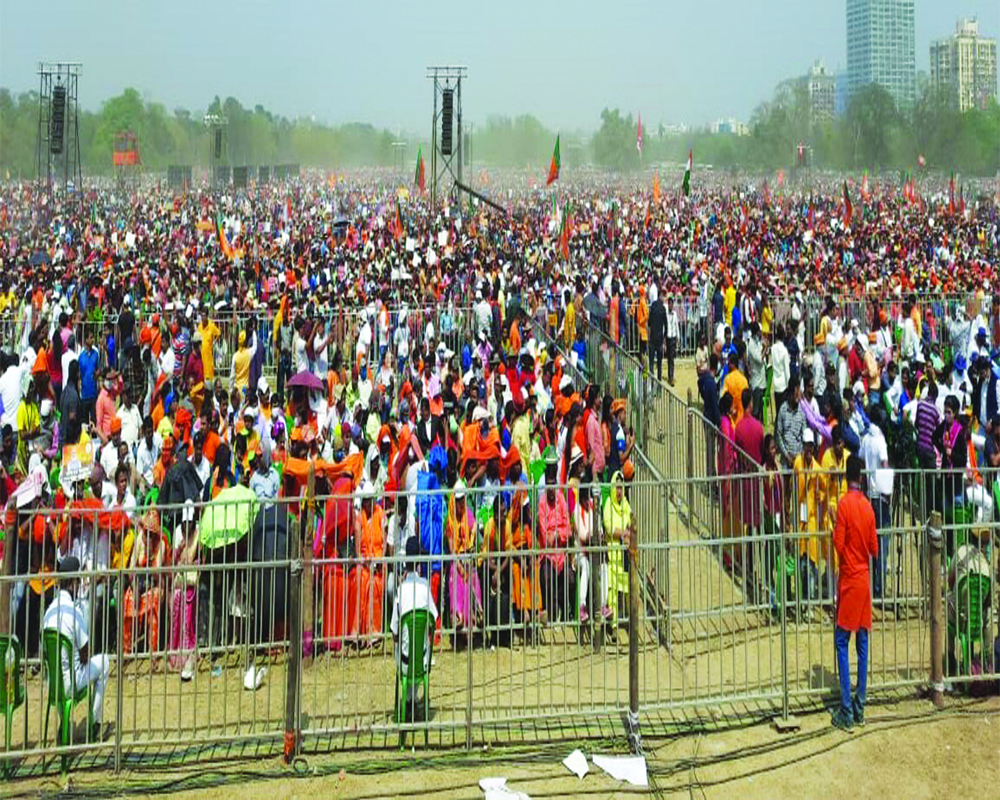The BJP may not have swept the State in the recent polls but its performance has been creditable, to say the least
The results of the hard-fought election in West Bengal have been more or less as expected. No doubt Delhi optimists are disappointed because they had hoped for a BJP majority. But their wishes were more like dreams. Understanding Bengal, I concede, is difficult. In an earlier article published in this journal, I had hinted at the unique features of Bengal. In early 1947, Netaji Subhas Chandra Bose’s elder brother Sarat and Kiran Sankar Sarkar on the Hindu side and Sir Abdul Rahim and Fazlur Rahman, the popular peasant leader, were negotiating for a united Bengal. It would have been a third independent dominion besides India and Pakistan.
Surprisingly, these friendly negotiations began within months of the Great Calcutta Killings of August 1946. Thousands had been killed in the name of Muslim League’s Direct Action Day. The instruction to resort to this action was from MA Jinnah to convey to the British Government that Hindus and Muslims cannot coexist in one country and, therefore, Partition had to precede Independence. As a result, Jinnah insisted on Pakistan being freed on August 14, a day before India got her Independence.
Jinnah encouraged the two Muslim leaders to somehow achieve a separate united Bengal. The Communist Party also supported Sarat Babu to clinch the deal. The reason was simply that with its majority Muslim population and a Prime Minister of the same community, a united Bengal was likely to support Pakistan in preference to India. Earlier, Jinnah had asked Muhammad Sa’adullah, the Premier of Assam from 1939, to categorise the adivasis as animists and not Hindus. The latter would then become a minority and the Muslims a majority, at least marginally. The idea was to grab Assam for Pakistan. Gopinath Bordoloi saved Assam in the nick of time by rushing to Delhi and getting the Congress high command to intervene.
Incidentally, the national anthems of both India and Bangladesh have been written by Gurudev Tagore. Nazrul Islam was a poet widely regarded as second only to Tagore. The traditional highway out of the Kolkata airport, called Dum Dum, was named the Nazrul Islam Avenue. The best Rabindra music singer nowadays is a Dhaka lady, Rezwana Choudhuri. She usually wears a sari and a red tika on her forehead, though without sindoor. Bangladesh’s quarrel with the Pakistani western wing began in February 1948 when Jinnah declared Urdu as Pakistan’s only national language. Their love for the Bengali language was demonstrated virtually the next day by Dhaka University’s students, who rioted on the streets for several days.
From then on to the end of 1971 was a very unhappy time for the East Pakistanis who became Bangladeshis. Thereafter, whenever they thought of Pakistan, they were Bengalis, and not so much Bangladeshis. Their radio talks about akash patal. It is mostly when they feel envious of their Hindu counterparts that they turn to calling the same phenomenon asmaan zameen. They are Bengali first, Bangladeshis second and Muslims third. The majority of the people of West Bengal, more or less, shares this order of priority. The BJP, therefore, should consider its 77 seats in the recent elections as a great success and by no means a defeat.
Do not forget that the BJP could hardly field a Bengali-speaking public figure to address big meetings. This matters a great deal to the Bengali. When I speak a few sentences in the language, the listener is delightedly surprised: “How nice is your Bengali!” Not because my grasp of the language is so good but because, having been brought up in Kolkata, I know that Bengali is first a melody and then a language. Many third-generation settlers do not realise this and the Bengali listener does not like his language being spoken without its lilt. In Gujarat, if any settler speaks in Gujarati, the reaction would often be why did he waste his energy learning the language? “We understand Hindi”! That is the infinite love in Bengal for its language.
That apart, after Syama Prasad Mookerjee passed away in 1953, if I remember correctly, for two general elections up to four Hindu Mahasabha candidates won as MLAs in Bankura. Thereafter, the score was zero for every Hindu party. Haripada Bharati was a respected person but he could not become an MLA for years despite being the leader of the Jana Sangh. Approximately, one-third of West Bengal is the successor of refugees from East Pakistan and Bangladesh. But until 2011, they were supporters of the Left Front. Is this not strange? But true. The Communists had openly supported Partition and yet these people, who families had to flee as refugees, did not care.
Given these difficulties, the BJP has done well going from three to 77 seats in five years. The TMC did very well. If a BJP member really thought that the party could get a majority, he was dreaming. Five years, of course, is a long time but time is like a perennial river which flows on, and opportunities are bound to offer themselves for the Opposition.
(The writer is a well-known columnist and an author. The views expressed are personal.)


























